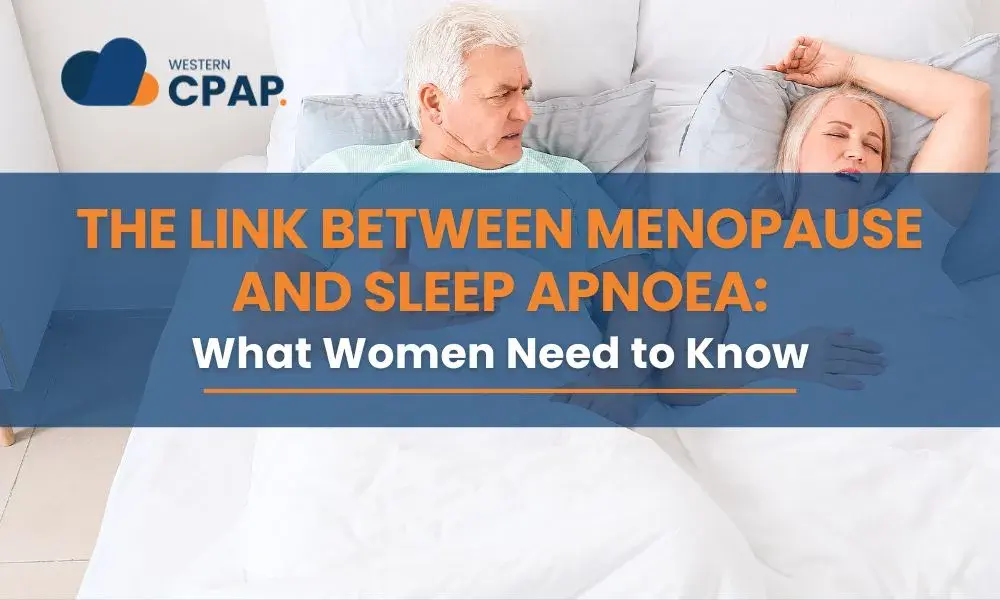- Free Shipping Options Available On Orders Over $300
- Price Match Guarantee
- FAQ
The Link Between Menopause and Sleep Apnoea: What Women Need to Know
Menopause and CPAP therapy are two topics that may not seem related at first glance, but for women experiencing sleep disturbances during menopause, understanding this link can make a significant difference in their quality of life.
Sleep disturbances are common during menopause, and they can be exacerbated by the presence of sleep apnoea. In this article, we’ll explore the connection between menopause and sleep apnoea, as well as the treatment options available for women experiencing both conditions.
Understanding Sleep Apnoea and Its Symptoms
Sleep apnoea, particularly its most prevalent form, obstructive sleep apnoea, is a condition marked by interruptions in breathing during slumber. These interruptions, where breathing may cease momentarily or become notably shallow, can recur several times through the night.
Symptoms that often accompany sleep apnoea include pronounced snoring, a pervasive sense of fatigue during daytime hours, experiencing headaches upon awakening, and episodes of irritability. Such indicators not only impair your quality of sleep but also have broader implications for overall health and wellbeing. Recognising these symptoms early on is crucial for seeking appropriate treatment and mitigating the condition’s impact.
Menopause and Its Impact on Sleep
The transition into menopause brings numerous physiological changes that can significantly disturb a woman’s sleep pattern. Hormonal fluctuations play a pivotal role, notably the decline in oestrogen and progesterone levels, which are crucial for regulating sleep. This hormonal upheaval often results in hot flushes and night sweats, notorious for disrupting sleep by causing sudden awakenings throughout the night. Furthermore, these hormonal changes can precipitate mood variations and anxiety, which in themselves are detrimental to achieving a restful night’s sleep.
The indirect consequences of these symptoms, such as increased stress and discomfort at night, can further compound sleep difficulties, leading to a vicious cycle of sleep disturbance. Also, the onset of menopause is frequently associated with the development of sleep disorders, including insomnia, which exacerbates the challenge of securing a good night’s rest during this transformative phase of life.
The Connection Between Menopause and Sleep Apnoea
Menopause marks a significant phase in a woman’s life where the body undergoes extensive hormonal transformations that can have profound effects on sleep health. Amongst these changes, sleep apnoea emerges as a condition intimately linked with the menopausal transition.
The decline in oestrogen and progesterone levels, hormones that are essential for maintaining muscle tone in the upper airway, predisposes the airway to collapse more readily during sleep, heightening the risk of sleep apnoea. This risk is further augmented by menopause-associated weight gain, which adds to the likelihood of airway obstruction.
The intricate relationship between hormonal adjustments and sleep apnoea underscores the necessity for heightened awareness and vigilance amongst menopausal women regarding their sleep health. Addressing this connection early can pave the way for timely interventions, helping to alleviate the compounded effects of menopause and sleep apnoea on women’s lives.
Diagnosing Sleep Apnoea in Menopausal Women
Identifying sleep apnoea within the context of menopause demands a nuanced approach, given the overlapping nature of their symptoms. Women navigating through menopause who find themselves battling persistent issues like significant snoring, excessive daytime sleepiness, or unexplained morning headaches should consider consulting a GP.
The confluence of menopausal symptoms with those of sleep apnoea can obscure the diagnosis. Therefore, a GP might suggest undergoing a polysomnography, or a sleep study, as a definitive means to monitor sleep behaviours and confirm the presence of sleep apnoea. This test is instrumental in charting the depth of sleep cycles and identifying any disruptions in breathing, thus providing a clear picture of one’s sleep health.
Through such targeted diagnostic measures, it becomes feasible to pinpoint sleep apnoea amidst the complex symptomatology of menopause, facilitating the initiation of appropriate treatment strategies tailored to the individual’s condition.
Treatment Options: Menopause and CPAP
Continuous Positive Airway Pressure (CPAP) therapy stands out as a pivotal treatment for sleep apnoea, offering a breath of fresh air to menopausal women grappling with this condition. This therapeutic approach utilises a specialised mask, which is worn over the nose and mouth during the sleeping hours, to supply a steady stream of air that maintains the openness of the airways, thus curtailing the interruptions in breathing that characterise sleep apnoea.
Beyond its primary function, CPAP therapy has been observed to offer additional benefits on the sleep quality and overall wellbeing of menopausal women. It not only addresses the core challenges of sleep apnoea but also contributes to mitigating some menopause-related disturbances, such as the frequency and intensity of hot flushes and night sweats. This synergy between managing sleep apnoea symptoms and alleviating menopausal discomfort through CPAP therapy underscores its significance as a comprehensive treatment modality.
By integrating CPAP therapy into their regimen, menopausal women can experience a marked improvement in their sleep patterns, paving the way for a more restful and rejuvenating night’s sleep.
Lifestyle Changes and Home Remedies
Incorporating certain lifestyle modifications and home-based interventions can significantly aid in alleviating symptoms associated with menopause and sleep apnoea.
- A focus on sustaining a balanced diet and engaging in regular physical activity is paramount, as these actions can facilitate weight management, a key factor in reducing the severity of sleep apnoea episodes.
- Steering clear of stimulants such as alcohol and caffeine, particularly in the hours leading up to bedtime, can enhance the quality of sleep by preventing disruptions to the sleep cycle.
- Avoiding large meals shortly before going to sleep can minimise the risk of discomfort and indigestion, which may further disturb sleep.
- Cultivating a nightly routine that promotes relaxation and tranquillity can play a crucial role in preparing the body and mind for rest. This might include practices such as reading, gentle yoga, or meditation to foster a sense of calm.
- Ensuring that the bedroom environment is optimised for sleep is also essential. This entails maintaining a cool, quiet, and dark room, equipped with a comfortable mattress and pillows, to create an ideal sleeping ambiance.
Implementing these changes can not only enhance sleep quality but also contribute to an overall sense of well-being, making them valuable strategies for managing the dual challenges of menopause and sleep apnoea.
Get the Sleep You Deserve With Western CPAP
Recognising the intricate relationship between menopause and sleep apnoea is essential for women’s overall wellbeing. By understanding how hormonal changes during menopause can exacerbate sleep disturbances you can take proactive steps towards diagnosis and treatment.
Act today to prioritise your sleep health and get the sleep you deserve. At Western CPAP, we offer a range of sleep solutions that fit many different lifestyles. Browse our range online or book a free consultation with our sleep specialists. Simply contact us by calling (08) 6185 1856 or visit us instore.






